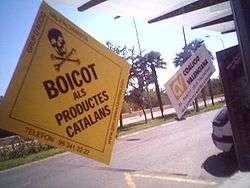Anti-Catalanism

Anti-Catalanism (Catalan: anticatalanisme, IPA: [ˌantikətəɫəˈnizmə]) is the collective name given to various historical trends in Spain that have been hostile to Catalan culture and traditions. In more recent times it is a term used to criticize political stances contrary to Catalan nationalism or Catalan independentism, both within and without Catalonia.
Description
In a historical and political context, anti-Catalanism expresses itself as a xenophobic attitude towards the Catalan language, people, traditions or anything identified with Catalonia and the political implications of this attitude. In its most extreme circumstances, this may also be referred as Catalanophobia. Several political movements, known for organising boycotts of products from Catalonia, are also actively identified with anti-Catalanism. It is a controversial term in Spain since Catalan political parties which support political independence are often accused of conflating criticism of their stances and actions with an attack on all Catalans.
Anti-Catalanism in its most virulent form is mostly associated with far-right Spanish political parties. Fringe groups such as España 2000 (none of which obtained more than 0.5% of the votes in the last general elections) object strongly to the autonomy enjoyed by Catalonia, claiming that the granting of autonomy to Catalonia and other regions will lead to the breakup of Spain.
Criticism of Catalan nationalism, is to be found throughout the Spanish political spectrum. However, such criticism does not usually imply hostility towards Catalonia itself, nor does it necessarily imply being against regional autonomy in Spain, or even the use of regional languages in the public domain. In fact, Ciutadans – which is possibly the most vocal of the Spanish political parties against the perceived excesses of nationalisms such as the Catalan – was created in Catalonia and has its national headquarters in Barcelona; this Catalan party – currently the main opposition party in the Catalan regional parliament – is equally referred to by Catalan nationalists as "anti-Catalan".[1] illustrating a certain tendence among pro-independence Catalan parties to interpret attacks on their political stance as xenophobic, populist or selfish attacks on all Catalans, nationalist or not. In this regard, black lists of so-called "bad Catalans" (Catalan public figures who oppose Catalan separatism) have been published.[2]
Adding to the confusion, Catalan nationalists have often labelled as 'anti-Catalan' previous policies of the Spanish or French state which, per se, were not directed specifically to the Catalan culture, but were a part of a general centralist vision of politics.
Besides politics, anti-catalanism is often also based on widespread perceived prejudices among regions of Spain. The stereotype of Catalans common throughout Spain involve a sense of them being industrious and excelling in entrepreneurship on the one side but also excessively individualistic, unfriendly, disloyal, snobbish or mean on the other side. This perception plays with political realities, Catalonia often being accused of lack of solidarity with the poorer regions of Spain, marginalisation of the Spanish language and culture (e.g. ban on bullfighting, absence of Spanish-language public education, prohibition of Spanish language signs in shops etc...) and historical discrimination or xenophobia against economic migrants from Andalusia, Extremadura or other Spanish regions. The degree to which the latter accusation is justified is debatable, particularly since the children and grandchildren of immigrants have successfully integrated into a multicultural Catalan society. However, arguments forwarded include that whereas the 20 most common surnames names in Catalonia proper are typical of the Spanish language,[3] the majority of politicians and politically designated posts are held by people with typically Catalan language surnames, and some of those who do not have them, 'catalanise' them upon embarking on a political career. In particular it has been noted that a pool of Catalan language surnames held by 13% of the total Catalan population holds 40% of the politically designated jobs, which has been called an 'overrepresentation' or even 'hyperrepresentation' in the political elite of these Catalan families vs. the Catalan society as a whole.[4]
Anti-Catalanism has a local and distinctive manifestation in the Valencian Community called Blaverism, a movement rejecting Joan Fuster's concept of Països Catalans.[5] Blaverism is best reflected in debates concerning the status of Valencian versus Catalan, even though this phenomenon has diminished greatly over the last 25 years. Also in Aragon there is an anti-Catalan movement that seeks to downplay the Catalan identity of La Franja, thus the Aragonese regional parliament passed a law to avoid referring to Catalan language as the language spoken in some parts of Aragon, forcing a neologism in its place[6][7] even though this was later on abrogated.[8]
See also
References
- ↑ NacióDigital. "NacióDigital: Terricabras: «Ciutadans i UpyD actuen a Europa militarment com anticatalans»". Retrieved 12 September 2016.
- ↑ Alós, Ernest (2 April 2016). "Una lista negra de malos catalanes". Retrieved 12 September 2016.
- ↑ "Los apellidos más frecuentes en Catalunya". Retrieved 12 September 2016.
- ↑ Vozpopuli. "La endogamia de las élites nacionalistas: 400 apellidos copan el 40% de la política catalana". Retrieved 12 September 2016.
- ↑ Xavier Coller [www.cairn.info/revue-pole-sud-2006-2-page-107.htm Collective identities and failed nationalism], in Pôle Sud 2/2006 (n° 25), p. 107-136.
- ↑ "Aragón excluye al catalán de sus lenguas oficiales, ahora se llama Lapao - RTVE.es". 9 May 2013. Retrieved 12 September 2016.
- ↑ País, Ediciones El (9 May 2013). "Las Cortes de Aragón aprueban llamar 'lapao' al catalán y 'lapapyp' al aragonés". Retrieved 12 September 2016.
- ↑ "El Gobierno aragonés liquida el Lapao". Retrieved 12 September 2016.
External links
Further reading
- Jaume Medina, "L'anticatalanisme del diari ABC (1916-1936)", Publicacions de l'Abadia de Montserrat | col·lecció Biblioteca Serra d'Or. ISBN 978-84-7826-606-7